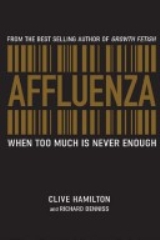
Affluenza: When Too Much is Never Enough
Encyclopedia
Affluenza: When Too Much is Never Enough is a 2005 book by Professor Clive Hamilton
and Richard Denniss
. According to the book, Western society is addicted to overconsumption and this situation is unique in human history. Hamilton and Denniss argue that people "aspire to the lifestyles of the rich and famous at the cost of family, friends and personal fulfilment", and that rates of stress, depression
and obesity
are high as people try to cope with the emptiness and disappointments of consumer life.
The authors even assert that some of Australia's richest people believe they do not have enough money to get by, even though Australians are three times richer than they were in 1950. Affluenza says that an increasing number of Australians are ignoring advertisers, reducing their spending, and reprioritizing their time.
Affluenza has been criticized as anti-capitalist because "the authors are unashamedly political, harshly criticising John Howard's government for preaching family values while undermining them through materialistic policies that place the market above all else."
Clive Hamilton
Clive Charles Hamilton AM FRSA is an Australian public intellectual and Professor of Public Ethics at the Centre for Applied Philosophy and Public Ethics and the Vice-Chancellor's Chair in Public Ethics at Charles Sturt University. He is the Founder and former Executive Director of the The...
and Richard Denniss
Richard Denniss
Richard Denniss is the Executive Director of The Australia Institute and Adjunct Associate Professor in the Crawford School of Economics and Government at the Australian National University in Canberra, Australia...
. According to the book, Western society is addicted to overconsumption and this situation is unique in human history. Hamilton and Denniss argue that people "aspire to the lifestyles of the rich and famous at the cost of family, friends and personal fulfilment", and that rates of stress, depression
Depression (mood)
Depression is a state of low mood and aversion to activity that can affect a person's thoughts, behaviour, feelings and physical well-being. Depressed people may feel sad, anxious, empty, hopeless, helpless, worthless, guilty, irritable, or restless...
and obesity
Obesity
Obesity is a medical condition in which excess body fat has accumulated to the extent that it may have an adverse effect on health, leading to reduced life expectancy and/or increased health problems...
are high as people try to cope with the emptiness and disappointments of consumer life.
The authors even assert that some of Australia's richest people believe they do not have enough money to get by, even though Australians are three times richer than they were in 1950. Affluenza says that an increasing number of Australians are ignoring advertisers, reducing their spending, and reprioritizing their time.
Affluenza has been criticized as anti-capitalist because "the authors are unashamedly political, harshly criticising John Howard's government for preaching family values while undermining them through materialistic policies that place the market above all else."

